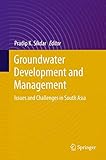Groundwater development and management : issues and challenges in South Asia / [edited by] Pradip K. Sikdar.
Material type: TextPublisher: Cham : Springer International Publishing : Imprint: Springer, 2019Edition: 1st ed. 2019Description: 1 online resource (XIV, 539 pages 171 illustrations, 22 illustrations in color.)Content type:
TextPublisher: Cham : Springer International Publishing : Imprint: Springer, 2019Edition: 1st ed. 2019Description: 1 online resource (XIV, 539 pages 171 illustrations, 22 illustrations in color.)Content type: - text
- computer
- online resource
- 9783319751153
- 551.4 23
| Item type | Current library | Call number | Status | Date due | Barcode | |
|---|---|---|---|---|---|---|
| E-Resources | Main Library E-Resources | 551.4 G882 (Browse shelf(Opens below)) | Available | E003670 |
Browsing Main Library shelves, Shelving location: E-Resources Close shelf browser (Hides shelf browser)

|

|

|

|

|

|

|
||
| 551.21 V911 Volcanic unrest from science to society / | 551.302 As846 Assessing recent soil erosion rates through the use of Beryllium-7 (Be-7 | 551.307 Ad244 Advancing culture of living with landslides. Volume 1, ISDR-ICL Sendai Partnerships 2015-2025 | 551.4 G882 Groundwater development and management : issues and challenges in South Asia / | 551.4 N935 Applied soil hydrology / | 551.415 G345 Geomorphology of desert environments | 551.46 P193 Aquatic chemistry concepts / |
1 Problems and Challenges for Groundwater Management in South Asia -- 2 Problems and Challenges for Groundwater Management in India -- 3 Modelling of Aquifer Systems -- 4 Application of Geophysical Techniques in Groundwater Management -- 5 Application of Remote Sensing and GIS -- 6 Application of Environmental Isotopes -- 7 Development and Management of Coastal Aquifer Systems -- 8 Spring Protection and Management -- 9 Drilling, Well Construction and Well Development -- 10 Pumping Test for Aquifers: Analysis and Evaluation -- 11 Fluoride Pollution in Groundwater -- 12 Arsenic Pollution in Groundwater -- 13 Arsenic Contaminated Irrigation Water and Its Impact on the Food Chain -- 14 Human Health Hazards Due to Arsenic and Fluoride Contamination in Drinking Water and the Food Chain -- 15 Treatment of Arsenic and Fluoride Contaminated Groundwater -- 16 Impact of Climate Change and Groundwater -- 17 Rainwater Harvesting and Artificial Recharging -- 18 Development and Management of Baseflow for Public Water Supply in Semi-Arid Hard Rock Area -- 19 Groundwater Policies and Law -- 20 Catalysing Peoples' Participation for Groundwater Management -- 21 Way Forward and Future Strategies.
This book deals with the challenges for efficient groundwater management, with a focus on South Asia and India, providing a balanced presentation of theory and field practice using a multidisciplinary approach. Groundwater of South Asia is increasingly confronted with overuse and deteriorating quality and therefore requires urgent attention. Management of the stressed groundwater systems is an extremely complex proposition because of the intricate hydrogeological set-up of the region. Strategies for sustainable management must involve a combination of supply-side and demand-side measures depending on the regional setting and socio-economic situations. As a consequence, the challenges of efficient groundwater management require not only a clear understanding of the aquifer configuration, but also demand for the development of a comprehensive database of the groundwater occurrences and flow systems in each hydrogeological setting. In addition, drilling and well construction methods that are appropriate to different hydrogeological formations need to be implemented as well as real-time monitoring of the status of the groundwater use. Also corrective measures for groundwater that is threatened with depletion and quality deterioration need to be installed. Finally, the legal framework of groundwater needs to be rearticulated according to the common property aspect of groundwater. These challenges should revolve around effective groundwater governance by creating an atmosphere to support and empower community-based systems of decision-making and revisit the existing legal framework and groundwater management institutions by fostering community initiatives. This book is relevant for academics, professionals, administrators, policy makers, and economists concerned with various aspects of groundwater science and management.
Description based on publisher-supplied MARC data.
There are no comments on this title.

